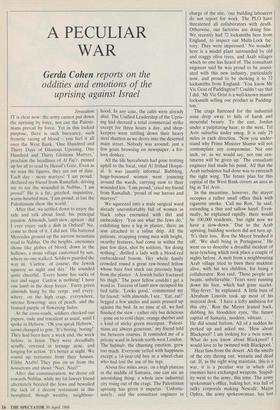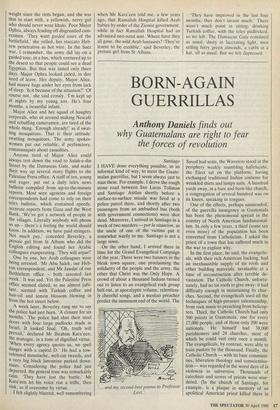A PECULIAR WAR
Gerda Cohen reports on the
oddities and emotions of the uprising against Israel
Jerusalem IT is clear now: the army cannot put down the uprising by force, nor can the Palesti- nians prevail by force. Yet in this locked purpose, there is such buoyancy, such frenetic racing of blood - you feel it all over the West Bank. 'One Hundred and Thirty Days of Glorious Uprising, One Hundred and Thirty Glorious Martyrs,' proclaim the headlines of Al Faj'r, pinned up for all to read by Herod's Gate. Even as we scan the figures, they are out of date. Each day - more martyrs! 'I am proud,' declared my friend from Ramallah, driving me to see the wounded in Nablus, 'I am proud!' He is a fat, grizzled, inquisitive, warm-hearted man. 'I am proud; at last the Palestinians show the world.'
After that, we settled down to enjoy the ride and talk about food, his principal passion. Almonds, lamb stew, apricot - did I ever enjoy such a dish in Oxford? No, come to think of it, I did not. His battered Mercedes ground up the narrow mountain road to Nablus. On the heights, anenomes shone like globes of blood; down in the hollows, a stone village cauterised by sun, where no one walked. Soldiers guarded the way in. 'Curfew, of course; the Jewish squeeze us night and day.' He sounded quite cheerful. 'Every home has sacks of rice and sugar. Curfew is nothing! I have one lamb in the deep freeze.' Furry green almonds hung by the verge, and every- where, on the high crags, everywhere, intense flowering: arcs of peach, and the bruised purple of flowering Judas.
At the cross-roads, soldiers checked our papers, rude and truculent as usual, until I spoke in Hebrew. 'Oh you speak Hebrew,' scowl changed to grin. 'It's boring, boring!' They had been here a week and, the week before, in Jenin. They were dreadfully scruffy, covered in teenage acne, and longing for action. 'It's better at night. We round up terrorists from their houses. Filthy Arabs! They piss on us from the housetops and shout -Nazi, Nazi!"
After due commiseration, we drove off towards Nablus, while my fat lawyer friend alternately berated the Jews and bewailed the lack of a decent restaurant in this benighted, though wealthy, neighbour- hood. In any case, the cafés were already shut. The Unified Leadership of the Upris- ing had decreed a total commercial strike except for three hours a day, and shop- keepers were rattling down their heavy steel shutters as we drove into the deserted main street. Nobody was around; just a few goats browsing on newspaper, a for- lorn donkey.
All the life hereabouts had gone trotting uphill to the focal, vital Al Ittihad Hospit- al. It was jauntily informal. Babbling, huge-bosomed women went jouncing around the wards, carrying stew to their wounded kin. 'I am proud,' cried my friend from Ramallah, 'proud of our heroes and martyrs!'
We squeezed into a male surgical ward already uncomfortably full of women in black robes encrusted with dirt and embroidery. 'You see what the Jews do,' exhibiting here a leg in plaster, there an arm attached to a saline drip. All the patients, strapping young men with bright, swarthy features, had come in within the past few days, shot by soldiers, 'for doing nothing', shrilled a lady with a blood-red embroidered bosom. Her whole family crowded round a great raw-boned fellow whose bare foot stuck out piteously huge from the plaster. 'A Jewish bullet fractured his thigh.' The poor fellow couldn't get a word in. Tureens of lamb stew occupied his bed table. 'Looks good,' commented my fat friend; 'with almonds, I see."Eat, eat!' begged a few uncles and aunts pressed up against the bed. In no time at all, we had finished the stew - rather oily but delicious - gone on to cold chips, orange sherbet and a kind of sticky green marzipan. 'Palesti- nians are always generous,' my friend told me between courses. It reminded me of a private ward in Jewish north-west London. The hubbub, the churning emotion, grew too much. Everyone yelled with happiness except a 14-year-old boy in a wheel-chair who had lost the use of his legs.
About five miles away, on a high plateau in the middle of Samaria, one can see an astonishing thing: a whole new industrial city rising out of the crags. The Palestinian uprising has given it impetus. 'Unfortu- nately,' said the consultant engineer in
charge of the site, 'our building labourers do not report for work. The PLO have threatened all collaborators with death. Otherwise, our factories are doing fine. We recently had 72 locksmiths here from England, to inspect our Multi-Lock fac- tory. They were impressed.' No wonder: here is a model plant surrounded by old and craggy olive trees, and Arab villages which no one has heard of. The consultant engineer said he was proud to be associ- ated with this new industry, particularly now, and proud to be showing it to 72 locksmiths from England. 'You know Mr Vic Grist of Paddington?' Couldn't say that I did. `Mr Vic Grist is a well-known master locksmith selling our product in Padding- ton.'
The crags flattened for the industrial zone drop away to hills of harsh and mournful beauty. To the east, Jordan under a palpitating haze; to the west, Tel Aviv suburbia under smog. It is only 25 miles in each direction. 'Now you under- stand why Prime Minister Shamir will not contemplate any compromise. Not one inch, or, as we would say, not one cen- timetre will be given up.' The consultant engineer had made his point. All that the Arab turbulence had done was to entrench the right wing. The future plan for this capital of the West Bank covers an area as big as Tel Aviv.
In the meantime, however, the mayor occupies a rather small office thick with cigarette smoke. 'Call me Ron,' he said, extending a thin and sallow hand. Even- tually, he explained rapidly, there would be 100,000 residents, 'but right now we have a slow-down.' Due to the Arab uprising, building workers did not turn up. 'It's their loss,' Ron the Mayor brushed it off. 'We shall bring in Portuguese.' He went on to describe a dreadful incident of near-lynching which took place a couple of nights before. A mob from a neighbouring Arab village tried to burn their mukhtar alive, with his ten children, for being a collaborator. Ron said, 'These people are beasts, unbelievable.' Tears were running down his face, which had gone scarlet. 'Hay-fever,' he explained. A little bust of Abraham Lincoln took up most of his mayoral desk. 'I have a lofty ambition for this city,' Ron the Mayor leaned back, dabbing his bloodshot eyes, 'the future capital of Samaria, modern, vibrant. . . He did sound forlorn. All of a sudden he perked up and asked me, 'How about Blackpool? I am looking for a twin town. What do you know about Blackpool? I would love to be twinned with Blackpool.'
Heat fans from the desert. All the smells of the city throng out, wistaria and dead cat. If, as the right wing maintain, this is a war, it is a peculiar war in which old enemies have exchanged weapons. Stupid- ity went to the army, this time. The army spokesman's office, baking hot, was full of sulky corporals making Nescafe. Major Ophra, the army spokeswoman, has lost
weight since the riots began, and she was thin to start with, a yellowish, nervy girl who should never wear khaki. Poor Major Ophra, always fending off disgruntled cam- eramen. 'They want guided tours of the battlefield,' she yelled, her staccato Heb- rew penetrative as hot wire. In the Suez war, I remember, the army did lay on a guided tour, in a bus, which ventured up to the desert so that people could see a dead Egyptian. But that war lasted only three days. Major Ophra looked jaded, in dire need of leave. Her deputy, Major Alice, had mauve bags under her eyes from lack of sleep. 'Is it because of the situation?' Of course not,' she said crossly. 'I'm kept up at nights by my young son. He's four months, a beautiful infant.'
Major Alice and her squad of haughty corporals, who sit around making Nescafe and rebuffing cameramen, are tired of the whole thing. 'Enough already!' as if swat- ting mosquitoes. That is their attitude: swatting mosquitoes. The army spokes- women put out reliable, if perfunctory, communiqués about casualties.
Anyone tired of Major Alice could always trot down the road to Salah-e-din Street by the Damascus Gate, and make their way up several stony flights to the Palestine Press office. A staff of ten, young and eager, put out a daily telex news bulletin compiled from up-to-the-minute reports. Most wire agencies and foreign correspondents had come to rely on their telex bulletin, which contained speedy, accurate reports from Gaza and the West Bank. 'We've got a network of people in the villages. Literally anybody will phone US up – there's a feeling the world should know. In addition, we have paid stringers.
Not much pay,' conceded Beverley, a Prosaic girl from St Albans who did the
English editing and found her Arabic
colleagues exasperating. 'They will argue!' One by one, her Arab colleagues were being arrested. `Mr Abu Saleh, our Heb-
ron correspondent, and Mr Jawdat of our Bethlehem office – both arrested last week.' It was sad. Yet the Palestine Press office seemed elated, to me almost jubi- lant, scented with Turkish coffee and hair-oil and lemon blossom blowing in from the hot street below.
A week later, Beverley rang me to say the police had just been. 'A closure for six months.' The police had shut their steel doors with four large padlocks made in Israel. It looked final. 'Oh, truth will prevail,' declared Mr Ibrahim Kara'een, the manager, in a tone of dignified virtue. When every agency quotes us, we spell danger with a capital D.' He had a tow- coloured moustache, well-cut tweeds, and a very big black limousine parked down- stairs. Considering the police had just
departed, the general tone was remarkably Calm. 'They have lost the battle.' Mr K. ara'een let his voice rise a trifle, then sink, as if overcome by virtue.
felt slightly blurred, well remembering when Mr Kara'een told me. a few years ago, that Ramallah Hospital killed Arab babies by order of the Zionist government, while in fact Ramallah Hospital had an advanced neo-natal unit. Where have they all gone, the wild Arab fantasists? 'They've learnt to be credible,' said Beverley, the prosaic girl from St Albans. 'They have improved in the last four months; they don't invent much.' There wasn't much point in sitting, drinking Turkish coffee, with the telex padlocked, so we left. The Damascus Gate remained as usual, dusty in lacerating light, men selling furry green almonds, a rabbi in a hat, all as usual. But we felt depressed.



























































 Previous page
Previous page